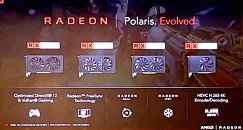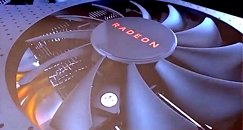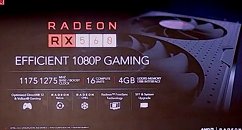Raevenlord
News Editor
- Joined
- Aug 12, 2016
- Messages
- 3,755 (1.20/day)
- Location
- Portugal
| System Name | The Ryzening |
|---|---|
| Processor | AMD Ryzen 9 5900X |
| Motherboard | MSI X570 MAG TOMAHAWK |
| Cooling | Lian Li Galahad 360mm AIO |
| Memory | 32 GB G.Skill Trident Z F4-3733 (4x 8 GB) |
| Video Card(s) | Gigabyte RTX 3070 Ti |
| Storage | Boot: Transcend MTE220S 2TB, Kintson A2000 1TB, Seagate Firewolf Pro 14 TB |
| Display(s) | Acer Nitro VG270UP (1440p 144 Hz IPS) |
| Case | Lian Li O11DX Dynamic White |
| Audio Device(s) | iFi Audio Zen DAC |
| Power Supply | Seasonic Focus+ 750 W |
| Mouse | Cooler Master Masterkeys Lite L |
| Keyboard | Cooler Master Masterkeys Lite L |
| Software | Windows 10 x64 |
A leak of what appears to be AMD's presentation on the Radeon RX 500 series has brought confirmation on specifications and details of the new line-up - which includes the RX 580, RX 570, the (until now) missing RX 560, and the RX 550. It would seem AMD has now opted for a new, dual-fan reference design, instead of their usual single-fan, blower-style coolers.
The RX 580 has a base clock of 1257 MHz, and a boost clock of 1340 MHz (74 MHz greater than the RX 480's 1266 MHz). It's a Polaris chip alright, packing the same 36 Compute Units (2304 Stream Processors, and up to 8 GB of GDDR5 memory across a 256-bit interface. AMD apparently decided to compare the RX 580 to the R9 380, which allows the company to show some relevant performance improvements (which wouldn't be possible with the RX 480, now would it.)










The RX 570 also keeps the same core configuration as the RX 470 it substitutes, but with an increased boost clock up to 1244 MHz (by 38 MHz over the reference values for the RX 470) over 32 Compute Units, and will be offered in 4 GB and 8 GB variants.

The RX 560, on the other hand, is where AMD has decided to mix up the game a little, with the RX 560 seeing an increased Stream Processor count over its previous-gen counterpart: 1024 against the RX 460's 896. It's TMUs also see an increase from 56 to 64, though the number of ROPs remains the same. It also features the greatest boost clock increase of the entire RX 500 series, at 57 MHz (to 1257 MHz on the RX 560 over the RX 460's 1200 MHz.) This card will see configurations with up to 4 GB memory over a 128-bit bus.

Finally, the new kid on the block, the RX 550 comes in at 512 Stream Processors (8 CUs) clocked in at 1183 MHz boost. Its 2 GB of memory seem appropriate to the crunching prowess of the little card that will, which AMD is positioning for competitive MOBA's and lower-requirements gaming.


View at TechPowerUp Main Site
The RX 580 has a base clock of 1257 MHz, and a boost clock of 1340 MHz (74 MHz greater than the RX 480's 1266 MHz). It's a Polaris chip alright, packing the same 36 Compute Units (2304 Stream Processors, and up to 8 GB of GDDR5 memory across a 256-bit interface. AMD apparently decided to compare the RX 580 to the R9 380, which allows the company to show some relevant performance improvements (which wouldn't be possible with the RX 480, now would it.)










The RX 570 also keeps the same core configuration as the RX 470 it substitutes, but with an increased boost clock up to 1244 MHz (by 38 MHz over the reference values for the RX 470) over 32 Compute Units, and will be offered in 4 GB and 8 GB variants.

The RX 560, on the other hand, is where AMD has decided to mix up the game a little, with the RX 560 seeing an increased Stream Processor count over its previous-gen counterpart: 1024 against the RX 460's 896. It's TMUs also see an increase from 56 to 64, though the number of ROPs remains the same. It also features the greatest boost clock increase of the entire RX 500 series, at 57 MHz (to 1257 MHz on the RX 560 over the RX 460's 1200 MHz.) This card will see configurations with up to 4 GB memory over a 128-bit bus.

Finally, the new kid on the block, the RX 550 comes in at 512 Stream Processors (8 CUs) clocked in at 1183 MHz boost. Its 2 GB of memory seem appropriate to the crunching prowess of the little card that will, which AMD is positioning for competitive MOBA's and lower-requirements gaming.


View at TechPowerUp Main Site





